#he just does this just happens i don’t make the rules here the monkees in my head do.
Text
sometime in the 80s in the tv show-verse davy starts calling peter ‘darling’.
#the monkees#davy jones#peter tork#he just does this just happens i don’t make the rules here the monkees in my head do.#he calls micky darling too but very sarcastically#and mike is MIIIIIKEEE#peter is very lovingly called darling because he is a darling and davy would call him one
11 notes
·
View notes
Text
1015.
5k Survey LXIX
3501. Is 'no glove, no love' your STRICT policy?
>> I don’t have policies for activities I don’t participate in in the first place.
3502. What is the best Epic movie (examples of epics: ben-her, gone with the wind, last temptation of christ)?
>> I don’t know what else falls into the category of “epic movie”, so... can’t really answer.
3503. Finish the sentance.
Hey, Hey we're the: Monkees
People say we:
But we're too busy:
The time to hesitate is: now
You're too: physical
It's a nice day to: start again
3504. Have you ever had 'missing time'?
>> Only in the context of being intoxicated (and that one botched suicide attempt).
3505. Have you ever sent an electronic greeting?
>> Maybe a long time ago.
3506. If you could send anonymous tips to people you knew who would never ever find out who sent them who would you send the following tips to?
doesn't know when to leave:
poor crotch hygenie:
talks to much:
band/art/dream is going nowehere:
most likely to get arrestted:
needs to get their life together:
bad taste in clothes:
bad taste in music:
needs a hobby:
3507. Are you more likely to download porn or disney movies?
>> I don’t download much of anything, really. Streaming has become my default mode of consumption.
3508. What is it with people?
>> ???
3509. Do you eat too much sugar?
>> I can assure you that I do not.
3510 Imagine you have aband. Let's name your band.
Adjective:
Animal(plural):
Your band name is (adjective) (animals) Under Glass!
Could be better? Let's try again.
Adjective:
Noun (plural):
Your band is (adjective) (nouns) With Puppets
3511. Are you desperate but not serious?
>> I have no idea what this means.
3512. Was there a time when you were younger and it took less to get you excited? What did it take then? What does it take now?
>> Honestly, I have no recollection of excitement experiences as a child. I do know that excitement is difficult for me nowadays because 1) I’m still pretty emotionally blunted, particularly for positive emotions and 2) I automatically attribute all physical feelings that could suggest excitement to anxiety instead (because I’m still learning the difference).
3513. Remember learning to write in elementary school? We spend 2 years learning to print..then they throw that out the window and teach kids cursive. Why? If cursive is so important and easy to read then why aren't books printed in cursive? Why aren't cursive computer fonts more popular? Why do buisness forms always say 'please print'?
Schools are so preoccupied with teaching kids the complicated but traditional skill of cursive writing that more emphasis is put on that than on teaching kids how to clearly express their ideas through writing. I move that cursive writing become a jr. high school elective instead of a grammer school priority. Who's with me?
>> This seems like a personal rant based on your own experiences and I have no dog in this fight, dude. I think of penmanship like art -- script writing is an art form and being adept at it can lead to some pretty results. Just don’t use it if you don’t care for it. Also, I’m pretty sure very few (public) schools care about cursive writing in this era, lmao, so this is also an outdated rant.
3514. Can you think of anything else (besides cursive writing) that is unhelpful, or unuseful, yet traditional and unquestioned? What?
>> Whatever.
3515. Name one female celebrity who you would guess wears size ___ clothing:
0?
5?
12?
16?
20?
3516. Have you ever been to a place where the restrooms were named in a clever way rather than just saying men's and woman's? I've seen Hens and Roosters, Bart and Lisa, Dudes and Babes...what have you seen?
>> Yeah, I saw “Pirates” and “Wenches” once. I’m pretty sure I’ve seen others but I can’t remember what they were now.
3517. What is the 'message' or 'point behind':
Fight Club?
Donnie Darko?
AI?
Minority Report?
Solaris?
A Walk to Remember?
You've Got Mail?
3518. have you seen, and what are your thoughts about these movies:
Drumline?
>> Now this is a question block I can actually answer. I did see Drumline, but I was 13 at the time so I have no real recollection of my feelings about it.
The Hot Chick?
>> Nope.
Maid in Manhattan?
>> Nope.
Star Trek: Nemesis?
>> Nope.
About Schmidt?
>> Nope. Okay, maybe I can’t answer this question block after all. What are most of these movies...?
Evelyn?
>> ---
The Guys?
>> ---
Intacto?
>> ---
The Jimmy Show?
>> ---
The Lord of the Rings: The Two Towers?
>> I did see this, but I don’t remember much of it either because it was at least half a decade ago. I do assume I enjoyed it.
Gangs of New York?
>> ---
Two Weeks Notice?
>> ---
The Wild Thornberrys Movie?
>> ---
Smokers Only?
>> ---
Treasure Planet?
>> ---
The Santa Clause 2?
>> ---
3519. START this sentance: ....and I think to myself, what a wonderful world."
>> ---
3520. What is:
insanity?
normal?
farenheit?
3521. Tell us about yourself in the third person for a bit:
>> I’d really rather not attempt that.
3522. If someone breaks a law, should they be punished if they did not know it was a law?
>> Oh, I don’t know. This is a concept that can get real thorny real fast.
3523. If it's so much easier to learn languages when we are very young (and it is, something to do with the developing brain) why do they wait until jr high and high school to teach them?
>> I don’t know anything about the justifications behind public-school curricula, dude.
3524. Name a band you sort of like: Dream Theater.
You are wearing that band's t-shirt in a store. SUDDENLY some guy you don't know comes up to you and goes, "Hey! You like (insert name of the band here)??!!"
This is obviously a really stupid question because if you didn't like them you wouldn't be wearing the t-shirt. Your witty reply is:
>> It’s not a really stupid question, first of all, because it’s a conversation starter as opposed to a straightforward inquiry. I’d assume he’s excited that someone else seems to be a fan of a band he likes, and is opening the floor to talking about it. Which is great! Let’s talk about prog metal!
Now, on the other hand, if the tone of “hey, you like Dream Theater?” is skeptical, like he’s assuming I’m just blithely wearing the shirt without actually liking the band or whatever, then I’d probably just give him a simple “yep” and see what happened after that. I’m not going to immediately be sarcastic or “witty” until I am positive about what kind of interaction is happening.
3525. If you were organizing cd's in a music store what section would you put each of the following in (don't forget the 'bargain bin' section!):
Blink182
Depech Mode
Weezer
Led Zeppelin
The Doors
Avril Lavigne
Nelly
Manfred Mann
Iggy Pop
Pink Floyd
Guns N Roses
Shakira
Britny Spears
Tool
Ozzy Osbourne
Madonna
The Rolling Stones
The Beatles
Motley Crue
Bon Jovi
3526. Does coffee stimulate your mind or body more?
>> It stimulates my anxiety drive, is what it does.
3527. Can you do 'six degrees of seperation' to anyone famous?
>> I assume not.
3528. What's the oddest thing in your home?
>> Me.
3529. Do you find it odd when people who are not handicapped use the handicapped stall:
in the bathroom?
>> No, I’ve used it because the close quarters of the other stalls wig me out sometimes. Or I’ve used it because the other ones were disaster zones. Or I’ve used it because I was also getting changed in the stall, or something, and needed the room.
in the parking lot?
>> You need a whole placard (or handicapped license plate) for those, so there are obvious rules.
3530. Do you sometimes find yourself talking to yourself? Do you answer yourself back?
>> No, I talk to the Inworlders, not “myself”.
3531. In your head do you call yourself 'I' or 'you' or both?
>> Er... “I”?
3532. What is the best excuse for why you haven't done your homework?
>> ---
3533. Someone tells you 'well there are black people, and then there are n*ggers'. What do you think?
>> I think that person’s an out-and-out bona-fide bigot, obviously? What the fuck else am I going to think (besides “I have to leave immediately”)???
3534. Does culture shape behavior or does behavior shape culture?
>> Yes.
3535. What determines whether a person will be:
intelligent?
pretty?
happy?
sucessful?
3536. What is social loafing? What is groupthink?
>> ???
3537. I have an idea. let's change the english language by making the words fewer, shorter and more concise. What do ya think?
>> No.
3538. What are the physical symptoms of:
joy?
fear?
shame?
3539. Here's the scenerio...your little eight year old brother is hangin out in the house when you come in..and catch him watching the playboy channel!
What do you do/say?
He says, "Why can't I watch this?" What is your response?
Why do you respond that way?
>> I don’t have an eight-year-old brother and I don’t know anything about how I would respond in a sibling-dynamic situation because I’ve never been in one.
3540. Who REALLY has a higher sex drive, girls or guys? How can you tell?
>> ---
3541. are you usually carefree?
>> No.
3542. Do you generally prefer reading to meeting people?
>> This is an odd comparison to make.
3543. Do you often long for excitement?
>> No.
3544. Are you mostly quiet when you are with others?
>> It depends on what kind of situation I’m in and what kind of day I’m having. And who the others are. And where we are. Context, people. Details. Please.
3545. Do you often do things spur of the moment?
>> No.
3546. Are you slow an unhurried in the way you move?
>> Sometimes. If I’m doing something I hate or that triggers me, then I tend to be a lot more hurried.
3547. Would you do almost anything for a dare?
>> I wouldn’t do anything on a dare.
3548. Do you hate being in a crowd who plays jokes on one another?
>> Er...
3549. Do you enjoy wild parties?
>> No.
3550. Have you ever paid for something priced more than $5.00 in only change?
>> No, but I was with someone that did. We had to scrounge for change in her car so we could buy enough gas to get us the rest of the way home, lol.
1 note
·
View note
Text
Long-haired weirdos on American TV
Buckle up kiddos; here we fucking go. Alright. In The Monkee fandom this is something we hear a lot about. “The Monkees” was so groundbreaking! It brought rock-n-roll music into America’s living room! It made the counter-culture acceptable! They were the first show to not have an authority figure! They were the first show to present long-haired young musicians as the good guys! And so on and so forth, ad nauseum. We hear this so much, I think it starts to lose its impact, not to mention the fact that for those of us who are not first gen fans (increasingly the majority of us) we lack the cultural context to understand just how significant this show actually was. So without further ado, here are some points to consider.
First, the hair. Looking back now, it seems laughable that in season 1 these guys: x

were considered to have “long hair”. But you have to understand. In the 40s, the US went to war. WWII was a “popular” war, which meant that if you were male you either were a soldier or you idolized soldiers. No homo. But as a result of this trend, military haircuts became popular. That meant short, practical hairstyles with clean-shaven faces. x
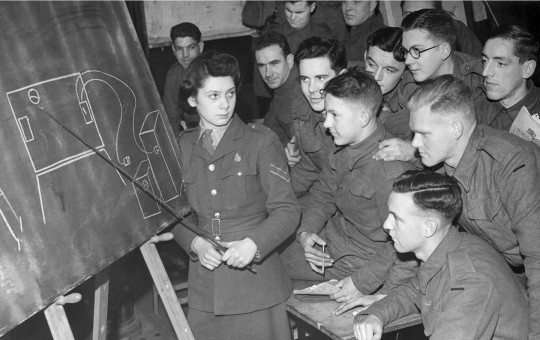
In the 50s, the US went back to war in Korea, and again in Vietnam which bled into the 60s. By that time, even though the US was not technically “at war” with anyone, the “young generation” was getting more and more fed up with being sent to fight and die for a cause they didn’t fully understand and were less and less sure they believed in. But in the early and mid 60s, soldiers and veterans were still heroes to the general public. So the growing opposition in the youth became a counter-culture movement, beginning as the beat generation and growing into the hippies.
These people rebelled against everything “mainstream”; they had sex before marriage, they had interracial sex, they had gay sex, they experimented with drugs, they bent gender lines, they wrote about all of the above and published it, they grew beards, and, wonder of wonders, they didn’t crop their hair.
So in the mid-60s, as a man, if you didn’t keep your hair short, it was public declaration that you rejected the values that America considered to be basic decency. If you let your hair grow, you were labeling yourself a deviant. That line that’s used a few times in the show? About men with long hair not being allowed into Disneyland? That wasn’t a joke, that actually happened.
And more than that, wearing your hair “long” as a man blurred the strict gender divide at the time. We see this a number of times in the show both scripted and not. In one of the post show interviews Davy tells a story about how he was mistaken for a woman on a trip to see his family, both by a fellow passenger and his sister. In another interview Davy is asked about being harassed for his hair. In “Monkees on Tour” Peter compare’s the length of his horse’s mane to his own hair and sarcastically asks if the horse is a “boy or girl”. In “Monkees Mind Their Manor” the man who comes to bring Davy to England mistakes Micky for a girl, and is nearly stabbed with a drumstick for his trouble. The butler in “The Christmas Show” tells the band they were expecting “four gentlemen” when they arrive. (Mike asks if they will accept four ladies who shave. They do.) And the only difference Mr. Babbitt seems to see between Mrs. Arcadian and Micky in “The Chaperone” is hair color.
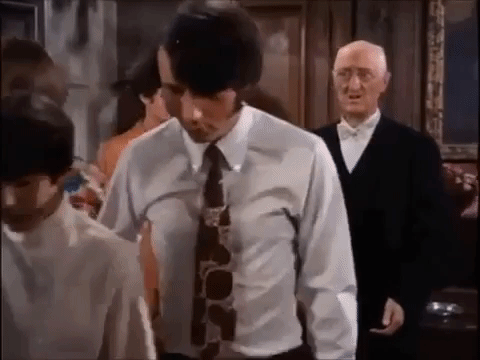
Now we come to the music, if the hair wasn’t bad enough. Rock-n-roll became a hit the 50s with artists like Elvis and Buddy Holly. (I should point out, among white audiences. Classic rock, like many other popular music genres such as ragtime, jazz, and hip hop, began among black communities first before spreading elsewhere.)
Rock in the late 50s scandalized older generations. The rhythms were more staccato and less “refined” than the crooners they were used to. Classical instruments like brass or strings were set aside in favor of drums, guitars/basses, and small percussion instruments instead. Performers danced in jerky, abrupt movements on stage while singing, and Elvis in particular made headlines by thrusting his hips which brought sex to the forefront. The name itself, rock-n-roll, derived from a slang term for “the deed” which, disappointingly, makes “sex, drugs, and rock-n-roll” redundant. Adults railed against this new type of music, calling it deviant and unclean. Young people, on the other hand, loved it.
And this was a bit of a gray area. As I’ll get into later, the idea of “young adults” or teenagers was only just beginning to become a concept. There were two kinds of people in the world, children and adults. And adults wielded absolute authority over children. So no one really knew what to do with the people old enough to chafe against authority but young enough to not be respected as one.
But the adults couldn’t deny that fact that rock music was extremely popular with young people. Chubby Checker, Chuck Berry, Buddy Holly, Elvis, The Beatles, and the list was only growing. As a result, this “rock fad” became an in-joke, something for those in power to mock. Look at any popular sitcom in the 60s and I guarantee it has a “rock band” episode that depicts a Beatles-esque band with their bangs in their eyes playing a sham parody of “music” while wildly and completely un-rhythmically “dancing”.
In “F-Troop” it’s “That’s Show Biz”. In “Gilligan’s Island” it’s “Don’t Bug the Mosquitoes”. In “The Dick Van Dyke Show” it’s “The Redcoats are Coming”. Such groups were always met with confusion and derision, and usually shrugged off in the end as “well whatever, but it’s not ‘Real Music’”. These bands were put in as commentary on current, real-life counterparts (mostly The Beatles) and they were meant to be laughed at. x

In the show the boys are often met with derision or outright animosity in regards to their music. The pilot, “Here Come The Monkees”, has a father reluctant to let them play at a country club, and even breaks down crying that he’s “sold out” (to rock culture) when the boys go on at the end. In “Monkees at the Circus” the circus performers are angry in general at what they see as no talent entertainers taking away their lively hoods. And we see how well-received the boys are by the “style gurus” in “Monkees a la Mode”.
Now let’s see, so far we have hairstyles that label you as “deviant” and a music genre that does the same thing. What else could we possibly throw in? Ah yes. Let’s take away all adult authority figures! As I mentioned before, young people in the 60s were just starting to have a voice of their own. The world was divided into adults and children, and adults ruled with an iron fist. Children needed to be guided, taught, and above all else controlled lest they stray into poor decisions. And adults were the only ones who could possibly tell “right” from “wrong”.
But on “The Monkees” there was no authority. The boys were their own moral compass, though Mike came pretty close to acting as the “dad” most of the time. In fact most of the adults on the show are either villains or someone who need the boys’ help. And make no mistake, despite all of them being in their early 20s Peter, Mike, Micky, and Davy were playing boys. They are almost universally referred to as such by every adult figure in the show, and make several comments themselves about being “too young to get married” or the like. Their characters were most likely not meant to be older than 17 or 18. (I think one of them has a line somewhere about being 16 but I can’t pin it down.) x
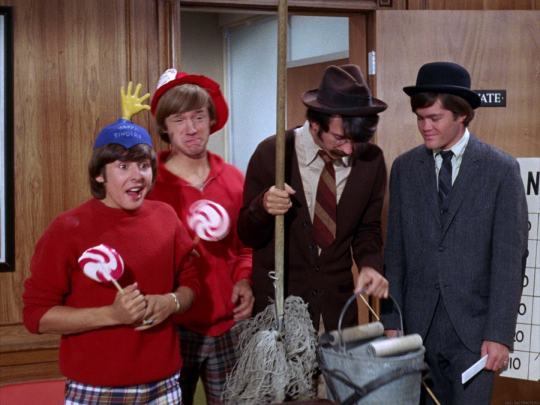
And all of this is not even mentioning the fact that, besides being “musicians”, the guys are unemployed! Between gigs and odd jobs, they’re “bums” who can’t “get a real job” which was, and still is, Not A Good Thing. But ultimately their career choice is treated as a serious one in the show. Their music is never a joke, and a number of times they use it to help people.
So. Long story short. “The Monkees” took a staunchly counter-culture style, a “deviant” music genre, thumbed their noses at authority, combined it all together and mixed well with a type of sharp, witty comedy that would have gotten nasty looks at the country club. Then they took aim at teens and tweens across the country and struck gold. Turns out the young generation did have something of substance to say after all.
69 notes
·
View notes
Photo
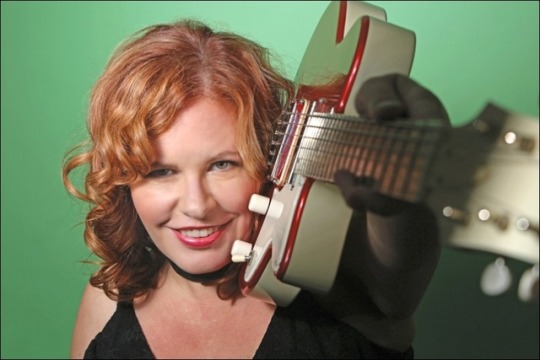
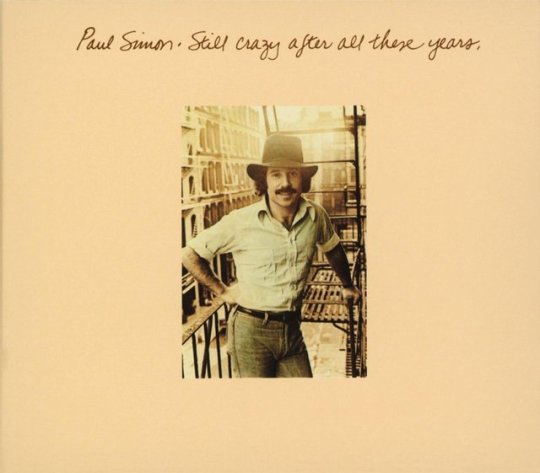
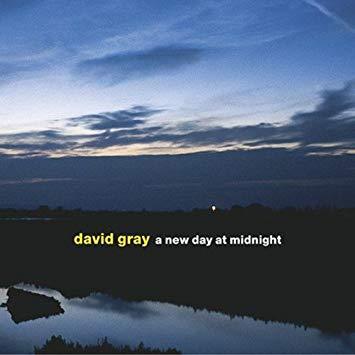

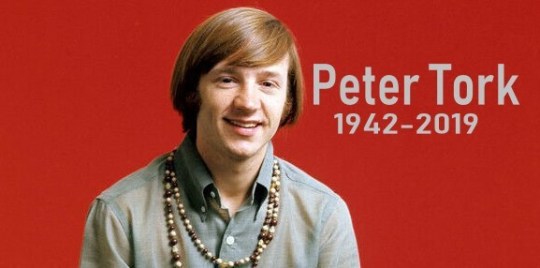
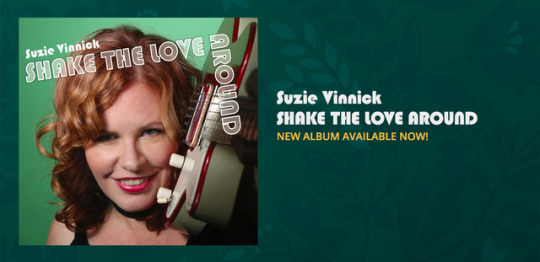
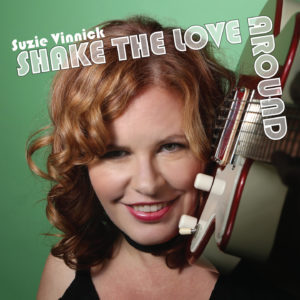
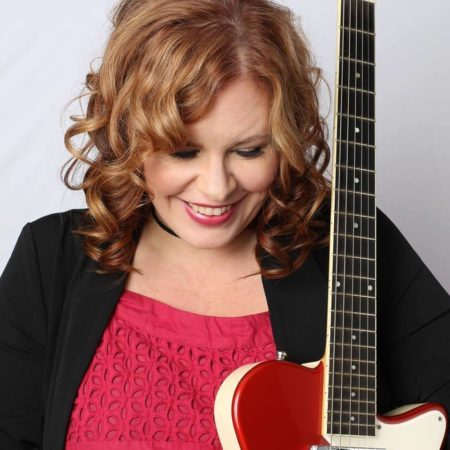
Consumer Guide / No.83 / Canadian singer-songwriter Suzie Vinnick with Mark Watkins.
MW : How did you find the pros and cons of Crowdfunding?
SV : I have done presales and crowdfunding for every album that I’ve recorded (six solo albums, and a number of collaborative projects). It is a great way to raise money for an album – it brings your supporters together in support of your art and enables them to be a part of making something happen. In a practical way, it also helps us artists keep from going into more debt as when you receive the monies in advance you don’t have to hit up your credit card (well maybe not as much ;-).
There’s not really any big cons; there is some administrative work but it feels good to send all the perks out (CDs, t-shirts, etc) knowing you have all this support for your music and art out there.
MW : Tell me about the tone & texture of the resulting album, Shake The Love Around...
SV : I have released six solo albums and another eight albums with other projects; Shake the Love Around is my latest roots and blues album and it’s a full band album (though I play a big part in the ‘band’).
My last two albums, Me ‘n’ Mabel and Live At Bluesville are both acoustic albums. Me ‘n’ Mabel is voice and guitar with some special guests and Live At Bluesville is just me and my little Larivee parlour guitar. I wanted to do an album that featured my voices – as a singer, as a guitarist, as a bassist and songwriter. I also played some lap steel on a few tunes.
I co-produced the album with my friend Mark Lalama which was a great experience. Mark is really easy going, I could bounce ideas off of him, he’d suggest things to me and we had a lot of flexibility to play with different musical ideas as the album was recorded at his home studio.
We chose songs for the album with as much of a positive message as we could – I had been through a few dark years and it was important to me to try and put some lightness out into the world. The album isn’t all ‘Pollyanna” and has a couple of darker leanings but is pretty positive for the most part. The title Shake The Love Around was named after a friends meal-time grace tradition. They’d have us all hold hands as someone said grace then at the end they’d say ‘shake the love around’ and invite everyone to shake their hands around, kinda like the wave. I always liked how my friends created community through their meal times and I thought that it’d make a fun title for the album.
I played guitar and I tracked the bed tracks along with drummer Gary Craig (Anne Murray, Blackie & the Rodeo Kings, Tom Cochrane). Afterwards, I added bass guitar, acoustic and electric guitars where needed and background vocals. Mark is a keyboard player and added some organ and accordion. Other players that contributed to the album were John Johnson, a Toronto based saxophone player; Kevin Breit and Colin Linden (a couple of my guitar heroes) played solos on a couple of tracks, and two of my album co-writers, David Leask and Dean McTaggart, sang some background vocals on the album.
MW : All your music releases to date are self-released. Is that by choice? Also, what are the advantages of such independence? Would you rule out going with a label?
SV : I’ve managed to have a full time career for almost 20 years as an independent artist. I get to choose what I do, when I do it, I own all of my recordings; there is definitely freedom in the independence.
The flip side to that is that being on a label may offer more support with bookings, promotion and support financially as well, so there might be less admin work and more time to create, perhaps? More show opportunities may come your way with more people working on your behalf.
I wouldn’t –not- consider it, but it would have to be a really good deal for me to consider going with a label.
MW : How long does the buzz last after coming off stage?
SV : I might have a bit of an adrenaline rush for a couple of hours after a show. It really depends how much travel I’ve been doing, how late my nights have been. Sometimes I will crash shortly after a show if it’s been a busy time, if there are time changes from the travel show to show.
MW : How do you usually unwind after a gig?
SV : After gig varies a bit as sometimes I end up heading back home so there’s not a lot of unwinding until we get home and hit the hay. But on a gig where I’m staying in town, after tearing down and packing up the merch I’ll usually head to the accommodations. If we’re being billeted we might sit and have a visit with the hosts or my band mates and have some snacks and a drink (maybe a shot of irish whisky, or maybe just a water lol) ; and, if I’m doing a solo performance and staying at a hotel I dive into my PJs, brush my teeth and cosy up in bed.
MW : Where do you usually shop for groceries? What are your main staples? Treats?!
SV : I buy groceries from the grocery store or Costco Warehouse; we live in the country so I tend to buy more stuff and store or freeze it to save us money and save us from have to drive back and forth to town.
Main staples tend to be fruits and veggies and the treats are chocolate and Chapman’s Vanilla Bean with Salty Caramel frozen yogurt – yum!!
MW : Thoughts on the sad passing of Peter Tork...are you a Monkees fan?
SV : I was sorry to hear of Peter Tork’’s passing. I used to watch The Monkees TV show every once in a while when I was a kid and am familiar with their music. I haven’t followed Peter in more recent years, but I do remember him being pretty funny. I’m originally from Saskatchewan (a province in Canada). I read that his father taught briefly at the University of Saskatchewan Regina campus and that he would come to Regina to visit him on occasion.
MW : List your Top 10 fave albums of all-time in order of merit, saying something about your No.1 choice…
SV :
This is my current list, but it changes…
10 Joni Mitchell – anything by her 9 Paul Simon – Still Crazy After All These Years (1973) 8 Heart – Greatest Hits (1998) 7 Stevie Ray Vaughan – Soul To Soul (1985) 6 Foo Fighters – Greatest Hits (2009) 5 Pink Floyd – The Wall (1979) 4 Rickie Lee Jones – Rickie Lee Jones (1979) 3 David Gray – A New Day At Midnight (2002) 2 Ry Cooder – anything by him 1 Supertramp – Breakfast In America (1979)
I first heard Supertramp when I was eleven; The Logical Song was their single at the time. Not sure why it resonated for me at that young age but I loved it. I was learning saxophone in school band and the music seemed accessible to me. I also loved singing along with Roger Hodgson and consider him a vocal influence.
MW : To round off, tell me about where you live and what’s to see & do...
SV : I live in an 1880's brick church in the Niagara Region of Ontario in the Township of Wainfleet.
When I am off the road touring, I like to go walking in the countryside. There are a lot of farms around here and big skies. It's quite beautiful.
When it's warmer, my boyfriend James and I might head to Lake Erie which is about 10 minutes south of our place and walk the beach or go for a swim and maybe have an ice cream.
There is a little town called Dunnville 10 minutes away where we'll go on occasion to hear live music and occasionally we'll drive to Welland (about 30 minutes away) to catch a film in the theatre.
The cities of Hamilton and Toronto are 1-1.5 hours away so sometimes we'll drive into the city to catch some music or head to a gallery but for the most part we stay close to home.
http://www.suzievinnick.com/
http://www.suzievinnick.com/video
https://soundcloud.com/suzie-vinnick
https://www.facebook.com/suzievinnickmusic
https://twitter.com/suzievinnick
https://www.instagram.com/suzievinnick
https://open.spotify.com/artist/2sMmcyVPI1JbcagQFS4dZg
© Mark Watkins / April 2019
0 notes
Text
New Post has been published on Ashley Parker Angel Daily • APADaily.net
New Post has been published on http://apadaily.net/2020/03/ashley-parker-angel-recalls-making-a-band-in-real-time/
Ashley Parker Angel Recalls Making a Band in Real-Time
Diehard pop fans want nothing more than to feel close to their favorite artists. Twenty years ago this month, ABC and MTV fulfilled that dream with the creation of Making the Band. The reality show is probably best known for its second iteration when Diddy modernized the program with R&B groups like Danity Kane, but in 2000, it was all about boy bands. Lou Pearlman, a manager and con man fresh off successfully creating Backstreet Boys, *NSYNC, and LFO, decided the next step in the lucrative teen pop business was to give fans what they always wanted: day one access, so that they, too, could feel like they participated in the creation of their beloved groups. And it began with O-Town.
After hand-selecting members in a countrywide search, Pearlman assembled O-Town with Ashley Parker Angel, Erik-Michael Estrada, Trevor Penick, Jacob Underwood, and Dan Miller, who replaced Ikaika Kahoano. The success of the show’s debut season inspired the network to continue the series, documenting the entirety of the band’s existence, including their discovery of Pearlman’s financial crimes and rumors of his alleged sexual abuse. O-Town broke up after only three years (a short run, even for the most flash-in-the-pan boy bands) but left the world with two memorable singles—“Liquid Dreams,” and the ballad “All or Nothing”—and a shockingly prophetic show that would influence future reality TV programming.
To mark the 20th anniversary of Making the Band’s premiere, I called up O-Town’s frontman Ashley Parker Angel to talk about the show. Our conversation below is condensed and edited for clarity.
JEZEBEL: On Making the Band, O-Town became television stars before you were music stars, and becoming a music star was the entire point. That feels like a really modern way to pursue a pop career. I guess in 2020, it’s social media instead of TV.
ASHLEY PARKER ANGEL: Me and my acting manager, when the audition came through, we thought [Making the Band] was a scripted TV show. We thought it was going to be scripted the same way the Monkees was a scripted show about a band, and then the Monkees obviously used that TV show to launch a legitimate recording career. Having talked to Lou Pearlman once I actually made the band, I’d come to find out that the Monkees were his inspiration. He wanted to make the next iteration of that, and who better to do that than the guy who just created the two biggest superstar boy bands of the day? *NSYNC and Backstreet were just dominating.
At the time, we didn’t have tons of reality TV. The ones that did exist were like Real World or Road Rules. It wasn’t the most popular format. O-Town was essentially two worlds crossing: the world of reality TV shows and the world of boy bands. Those two worlds emerged into Making the Band as an experiment. Nobody knew if it would work. They would even refer to us as lab rats throughout the whole process. The first season was a full 22 episodes, and by the time 20 episodes had aired and it was a hit TV show, we still did not have a record deal.
Because of the success of the TV show, we were able to get the interest of Clive Davis. Cameras flew with us to New York. We signed the deal the week before the finale was going to air. They very quickly edited in the footage of us signing. If you look at what’s happened now with American Idol and The Voice, I think Making the Band really proved that that format could not only be a successful television series, but it can actually launch a legitimate recording group that could have legitimate hit songs on the radio.
And then other people caught wind. Simon Cowell ended up being in one of the early meetings we had with Clive Davis. Very quickly after that, he goes and does Pop Idol. We’d always heard on the record label side that Simon Cowell had been really inspired by what happened with Making the Band and O-Town—so he started Pop Idol, that becomes a huge success, and then, of course, Pop Idolbecomes American Idol.
Pop music has a storied history with reality TV—like everything you were saying about American Idol and The Voice, but also One Direction 10 years later. They were made on The X-Factor UK, and they lost. The experiment with boy bands and reality TV has continued.
Right. And it doesn’t always work. Just because you have a TV show doesn’t mean it’s going to translate to actual radio play. ABC tried to launch a show based on Making the Band called Boy Band. Nick Carter was a judge on it. Timbaland was a judge on it. There was a big primetime push. And then nothing. Those guys are not around. I don’t think they were able to mount a successful single.
I actually really liked that show, but I also love boy bands.
I did, too. As I watched it, I was like, “Oh, they’re doing Making the Band but with a new spin, those superstar judges, which is going to add that American Idolelement.” But it just didn’t pop.
I was listening to a podcast recently with Paris Hilton and she was talking about The Simple Life, which debuted in 2003. She argued that unlike reality television today, reality TV of the early 2000s wasn’t as manufactured or fabricated. Do you agree with that?
I tend to agree with her comment. Yes, there are things being manipulated behind the curtain when you’re in that world. Yes, good reality TV producers see where the conflict is happening, and they massage your life from behind the scenes to make sure those conflicts occur, but those conflicts are real. They’re capturing real life. Obviously, you can do a lot in editing, but primarily [Making the Band] was a very real situation we were all going through.
We had cameras living with us in the house we were living in as O-Town. We had hidden microphones in the house. In Making the Band, if you had a conversation in the middle of the night, these huge production lights would pop on and some guy, another guy with a boom microphone, and a cameraman would rush in. It didn’t matter what time it was. They would film everything. You couldn’t leave the house without telling them because they wanted a camera crew on you. As it went on, however, even by the third season of Making the Band, there was a lot more soft scripting going on. A lot more of producers saying, “Hey, we need you to have a conversation on camera about this.” They’re really kind of directing it more.
How did O-Town try to differentiate itself from the other boy bands at the time?
Making the Band came about at a time where you had a pretty dense field of pop bands. You had LFO, BBMAK—outside of Backstreet and *NSYNC, you had so many offshoots of bands in that style—of course, 98 Degrees. Without the show, there was a lot of noise in an already crowded room. I think the TV show set us apart because now it’s a window into this life that you would never get from just listening to an album. You’re now living in this world. You get the chance to be a fly on the wall and watch that process in a TV show. It set us apart in a way that would’ve been very difficult had we not had the show. I’m not saying we weren’t talented guys, but we had the benefit of being a part of something manufactured, which allowed there to be a higher degree of talent pulled from all these different cities.
I agree. But also, I think of the pop songs of the era—“Liquid Dreams,” come on, you were the boy band unafraid to get sexual. That separates you.
[Laughs] Thank you! I will add to that, too, we were set to do a fourth season of Making the Band. The TV show was always a hit, even though music changed and started to go more R&B and alternative rock again. The second album didn’t sell what the first album did, but the show was still getting really awesome ratings. So we moved into production for Season 4. At that point, a lot of guys in the band were not as excited to keep living on camera. We had a lot of internal debates about whether or not we should be a TV band or if we should move away from that and try to convince people of the longevity of our career. I, personally, always felt the two were connected. Then things started to change. When we got dropped by our record label, MTV also dropped the show. In the end, [the band] did mutually decide to call it quits for a while and all go our own ways with the idea that maybe we would come back in the future.
For the first two albums, we had this unbelievable hitmaker, Clive Davis, and we had ABC and MTV supporting our careers. Once we kind of lost those things, I could see the writing on the wall.
Not only does that sound like a clean break, but you also have a documentary of the entirety of O-Town in Making the Band. That’s unique to your group—even considering later seasons of Diddy’s revamped Making the Band. I think the only thing that’s comparable might be K-pop boy bands whose social media streaming is archived.
You’re so right; it’s so rare. It’s this little window into your life for three or four years. Who has that? And what a crazy time to have captured: a life-changing moment, and here it is in these well-produced, well-edited snapshots of your life.
At the time, were you cautious about working with Lou Pearlman? The show premiered a year or two after both Backstreet Boys and *NSYNC cut ties with him, so litigation must’ve been going on while you were filming.
There was a really specific 20/20 special that aired that was all about *NSYNC and Backstreet’s legal troubles with Lou. Up until that point, Lou was the most charming businessman you’d ever meet. He was obviously making the careers of young pop stars. He was a fun character to be around. Once it started hitting the mainstream media, and you’re hearing all these legal terms and trouble, that definitely started to throw some salt on the situation. And Lou started getting really pushy about us signing contracts. I’ll never forget the first lawyer we hired to look at our initial contract with Lou and said, verbatim, “In my 30 years of entertainment law, this is the worst contract I’ve ever seen.” That added fuel to the fires of what was already happening with Backstreet and *NSYNC.
Some of that actually ends up spilling out onto Making the Band; some of the storyline gets shared. Things start getting sort of intense because he wants certain things we are not signing. So he cuts off our money supply. There were weird scenarios like that that started to occur. But once Clive Davis came into the picture and we had two managers, we side-stepped a lot of trouble with Lou, whereas Backstreet and *NSYNC were right in it with him. We had a lot of other people around us, caretakers to say, “Hey, by the way, there are some other rumors about Lou. Don’t be alone with him.” Those kinds of things.
I remember at one point we were with Lou in his office, and literally, he said, “Guys, I would love to keep this meeting going, but the FBI are here, so we’re going to have to wrap this meeting up now. Because the FBI are here.” And, no joke, the FBI came in and they investigated the offices while we were there.
What? Where’s that footage?
I know! It’s all come out now. Lou was sharing with me, in private, some of his con man-style tricks. Like, he had pictures of himself in his offices where it looked like there were these 747 airplanes in the back, supposedly he had this airplane company, and he goes, “Look at this picture of me with this airplane on the tarmac. Do you see anything weird about that photo?” And I go, “No, it’s you with your 747 airplane.” And he goes, “That’s a model airplane, hanging from fishing string, held from the right perspective so it looks like a full 747 airplane.” He was using little miniature models, and using little tricks of the eye, to make it look like these little miniature airplanes were real airplanes. He would use pictures like that to convince investors that he had all these companies and airplanes. As an 18-year-old kid, I’m thinking, Wow, this guy’s really smart, but also, Wow, this is so illegal, but he’s bragging to me about it.
I’m surprised he revealed his tricks to you.
It was total Catch Me If You Can, that movie. You’re kind of impressed because it’s this evil genius type of thing, but it’s still lying and fraudulent. Now it’s all coming out after years of being investigated by the FBI. That was when things really started to go South for Lou.
Some of your issues with Lou are documented on Making the Band, but he was also an executive producer and creative consultant. Did he have to approve the storyline? The show doesn’t paint him in the best light, but now it’s well-documented that he was guilty of so much more than what was presented on the show.
I wasn’t there, so this is speculation, but I imagine Lou regretted involving himself on camera and not having complete control of it. Lou didn’t think he did anything wrong. Lou’s giving hope to these young, talented kids that would never have a shot. He’s Mr. Money Bags. He’s coming up with millions of dollars behind the scenes—for rehearsals, styling sessions, and putting demos together to actually get you to the place where you can sign a deal—so he never looked at himself as having done anything wrong. The guy could sell anything to you. He was a master salesman. If you sat in a room with him, he’d have you convinced that he was Mother Theresa. He was very good and very shrewd at business. He was just taking advantage in so many different ways. And yet, he was the Berry Gordy of the Motown era, but it was all in O-Town, this whole new pop phase of music that he ushered in with *NSYNC, Backstreet, Britney, Aaron Carter, O-Town, and LFO. His fingerprint was on all of that, and that was a huge movement in music. It’s too bad that he was as crooked as he was.
How do you view the legacy of Making the Band, 20 years later?
There are always going to be gatekeepers, but I think the barriers of entry started coming down with shows like Making the Band. Now you have an opportunity, on a national level, to hear about an audition and show up for it. Making the Band was a shot for someone who would’ve never had a shot. Shows like American Idol and The Voice have continued to take that concept even further.
Making The Band really was the first of its kind. We proved the platform could work because we actually transformed it into a legitimate music career. For young, hopeful, talented people out there, I’m glad that Making the Band could pave the way, and I’m glad there are even more formats like this for young, talented, hopeful people who’d like a shot at success.
SOURCE
0 notes
Text
RULES: Choose any three fandoms (in random order) and answer the questions, then tag 10 people.
(if you don’t wish to see this post, please press j)
TAGGED BY: @hornyliverpudlianputz , my dearest monkee partner in crime. thank you and i havent done a personal post in like legitimately probably 3 years so lets go
Three fandoms:
* EUReKA
* The Monkees (what a shock)
* Dr. Who (very nearly picked the x files but lets roll w/ it)
(for the sake of simplicity i’ll be doing original runs only for that which applies.)
The first character you loved:
EUReKA - Nathan Stark. He wasn’t in the first episode and I still loved the show from the first viewing but. Definitely him. He’s still in like, my top three characters of all time.
The Monkees - Before I knew anything about the show, Mike was my favourite. I defaulted onto him when I started watching until Micky took over as my favourite.
Dr. Who - The Doctor. (What a shock) I started with the very first episode, An Unearthly Child, and he’s just such an interesting and charismatic character.
The character you never expected to love so much:
EUReKA - Taggart. He’s not my favourite character but I still really like him. He doesn’t do well to ingratiate himself in the first episode but once he’s not openly hostile to Jack and you learn more about him he became one I really enjoyed (and missed when he kind of got phased out)
The Monkees - Micky. He’s my favourite by a wide margin now, as anyone who knows me will tell you, but before I watched it (and even in the first few episodes) he was very under my radar. I’ve known vaguely about the Monkees my whole life but I had a very different idea of what they were compared to what they actually are just because of a lack of information, and I’d centred on Mike before I knew anything about any of them. Upon my first viewing Mike was still my favourite but Micky crept into my notice and I ended up falling in love with him.
Dr. Who - There are a lot of characters this could apply to - Jamie McCrimmon and the Sixth Doctor, my favourite companion and incarnation, fall under this category - but the most unexpected one was definitely Kamelion. He’s an automaton who is in legitimately only two serials, the one he’s introduced in and the one he’s killed off in. They do very little with his character but something about him fascinates me, and now he’s in my top 3 companions. Don’t ask why I can’t even explain it
The character you relate to the most:
EUReKA - Nathan Stark. He’s more of an asshole than I am, but there are definite similarities, and as I discovered EUReKA while I was in middle school I probably grew to embody more of his character traits than I had originally because of how much I love him. He’s driven, snarky, sarcastic, intelligent, determined to find the answer/truth to things he cares about, and he obsesses over things that interest him. In some ways I’m more similar to Zane than Nathan, such as being lazy about things I don’t care about, but Nathan definitely wins out here.
The Monkees - As much as I’d like to say Micky, it’s deffo Mike. I’ve got that sarcastic, deadpan humour and a snark, and sometimes I have to restrain myself from making a joke that will definitely be read as being harsh. I’ve got a bit of a strong personality that leads my friends to default on me if they don’t want to make a decision, a cool head under pressure (he usually has the coolest, dependent on what’s funniest for a gag) and a few other related traits Mike has, too. I’ve got Micky’s propensity for schemes and plans and his (usually present) reliance on science, but Mike for sure.
Dr. Who - It’s a break between Romana I and Zoe. Zoe is very scientifically minded and can be quite stubborn and pushy about her way, which I definitely can be, but Romana I is like a more naive, haughty version of myself. If I was actually driven to get perfect scores and had a bigger ego, we’d be the same person.
The character you’d slap:
EUReKA - There are a few, but General Mansfield is up there. I know he’s just doing his job but like you gotta be an asshole about it?
The Monkees - Captain Crocodile for singling out and then embarrassing Micky on the telly. Also Mr. Babbitt even though the guys kind of deserve him berating them about months-late rent
Dr. Who - That bitch Dastari from the Two Doctors for selling out and betraying not one but two incarnations of Dr. Who at once and in general being a spineless bastard
Three favorite characters (in order of preference):
EUReKA - Nathan Stark, Zane Donovan, and either Deputy Andy or Taggart
The Monkees - Micky, Mike, then Peter or Davy dependent on the episode
Dr. Who - I’ll split this into companions and then Doctors. For companions it’s Jamie McCrimmon, Romana I, and Kamelion, and for Doctors it’s Six, Two, and One
A character you liked at first, but don’t anymore:
EUReKA - Most of the characters I made my opinion pretty quickly after getting ample information on them. I guess the person who fits in here the best is Henry, as I liked him, then disliked him, and then grew to like him again. Henry’s a very complex character and it’s part of that which led to me liking him less - he starts out very friendly and funny but as terrible things happen to him he, understandably, gets withdrawn and less enjoyable. There’s more than a bit of a disconnect between how I would have handled things and how he handles things, and he does make a lot of mistakes - while that’s human, some of them just make him less likeable overall until he heals over the later seasons.
The Monkees - None of them fit into this category proper. The closest thing I can say is that Mike was my favourite first and was then overtaken by Micky, but he’s still my second favourite, and I love all the boys dearly. There aren’t really many recurring characters of note, and those that do exist did not undergo a change in my opinion of them.
Dr. Who - The Fifth Doctor. I still like him, I don’t hate any of the incarnations, but he was my second favourite for quite a time. I guess after watching enough of his serials I started to grow a bit weary of his demeanour? Or at the very least favour other incarnations. Still good though.
Three OTPs:
EUReKA - Uhhhhh probably Henry and Kim (if all that bullshit hadn’t happened), Jack and Allison, and like. Fargo and Claudia. It counts.
The Monkees - I don’t ship the guys with each other and don’t have any ships of them with others, really. Davy does enough of it to carry over to everyone, don’t you think? Or I could be a prick and say Micky is mine.
Dr. Who - Barbara and Ian, Ben and Polly, and either Tegan and Nyssa or One and Cameca
I tag @thekingsstudy and @codeobsidian cos idk a damn person on here
#i was this close to slapping on a read more and answering these for the x files too so#i hope everyone is glad ive spared you
0 notes